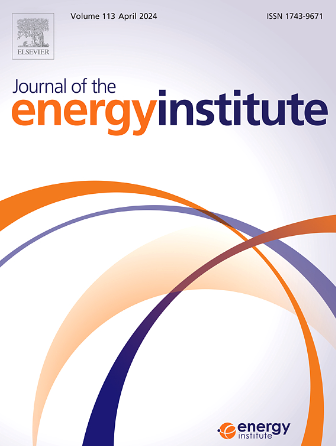Modeling of sustainable methanol production via integrated co-gasification of rice husk and plastic coupled with its prediction and optimization using machine learning and statistical-based models
IF 5.6
2区 工程技术
Q2 ENERGY & FUELS
引用次数: 0
Abstract
To reduce reliance on fossil fuels and mitigate environmental impact, co-gasification of waste materials presents a promising alternative for methanol production. In modeling gasification process, kinetic-based models are predominant but are often complex and lack inherent optimization capabilities. This study couples a kinetic-based model with predictive models, aiming to provide an optimization-embedded and simplified simulation approach. Using Aspen Plus, an integrated model for methanol production via co-gasification of rice husk and plastic was developed. Model prediction and optimization were performed using response surface methodology (RSM) as a statistical approach and artificial neural network-genetic algorithm (ANN-GA) as a machine learning approach. Key input variables, including gasification temperature (GT), steam-to-feed ratio (STF), methanol production temperature (T) and pressure (P), were optimized for both the co-gasification and methanol sections. The integrated co-gasification-methanol model was successfully developed, achieving a root mean square error (RMSE) of 2.31 when validated with experimental data. Predictions using both ANN-GA and RSM methods yielded a coefficient of determination (R2) > 0.99, with ANN-GA showing superior prediction accuracy. Statistical analysis of variance (ANOVA) from the RSM results also confirmed the model significance. The optimal methanol yield was 0.6 kg/kg feed under GT = 850 °C, STF = 0.96–1.73, T = 234–255 °C, and P = 114–150 bar. While ANN-GA provided superior optimization across most variables, RSM was more effective for optimizing pressure. These findings demonstrate the effectiveness of integrating machine learning and statistical models with kinetic-based simulations for optimizing an integrated gasification-methanol system.

通过稻壳和塑料的综合共气化,建立可持续甲醇生产模型,并使用机器学习和基于统计的模型进行预测和优化
为了减少对化石燃料的依赖和减轻对环境的影响,废物共气化是甲醇生产的一个有前途的替代方案。在气化过程建模中,基于动力学的模型占主导地位,但往往复杂且缺乏固有的优化能力。本研究将基于动力学的模型与预测模型相结合,旨在提供一种优化嵌入和简化的仿真方法。利用Aspen Plus,开发了稻壳和塑料共气化生产甲醇的集成模型。采用响应面法(RSM)作为统计方法,人工神经网络遗传算法(ANN-GA)作为机器学习方法进行模型预测和优化。主要输入变量包括气化温度(GT)、蒸汽进料比(STF)、甲醇生产温度(T)和压力(P),对共气化和甲醇段进行了优化。成功建立了共气化-甲醇集成模型,经实验数据验证,其均方根误差(RMSE)为2.31。使用ANN-GA和RSM方法的预测均产生了决定系数(R2) >;0.99, ANN-GA具有较好的预测精度。RSM结果的方差统计分析(ANOVA)也证实了模型的显著性。在GT = 850℃,STF = 0.96 ~ 1.73, T = 234 ~ 255℃,P = 114 ~ 150 bar条件下,甲醇的最佳产率为0.6 kg/kg。虽然ANN-GA在大多数变量上提供了更好的优化,但RSM在优化压力方面更有效。这些发现证明了将机器学习和统计模型与基于动力学的模拟相结合以优化集成气化-甲醇系统的有效性。
本文章由计算机程序翻译,如有差异,请以英文原文为准。
求助全文
约1分钟内获得全文
求助全文
来源期刊

Journal of The Energy Institute
工程技术-能源与燃料
CiteScore
10.60
自引率
5.30%
发文量
166
审稿时长
16 days
期刊介绍:
The Journal of the Energy Institute provides peer reviewed coverage of original high quality research on energy, engineering and technology.The coverage is broad and the main areas of interest include:
Combustion engineering and associated technologies; process heating; power generation; engines and propulsion; emissions and environmental pollution control; clean coal technologies; carbon abatement technologies
Emissions and environmental pollution control; safety and hazards;
Clean coal technologies; carbon abatement technologies, including carbon capture and storage, CCS;
Petroleum engineering and fuel quality, including storage and transport
Alternative energy sources; biomass utilisation and biomass conversion technologies; energy from waste, incineration and recycling
Energy conversion, energy recovery and energy efficiency; space heating, fuel cells, heat pumps and cooling systems
Energy storage
The journal''s coverage reflects changes in energy technology that result from the transition to more efficient energy production and end use together with reduced carbon emission.
 求助内容:
求助内容: 应助结果提醒方式:
应助结果提醒方式:


